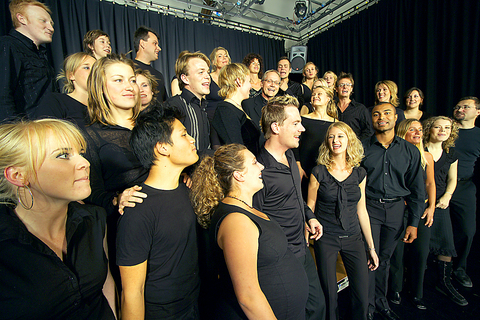Though Haitang Typhoon did its best to dampen the festive spirit during the first half of the Taipei International Choral Festival, there are still several good reasons to make it to the National Concert Hall for the festival's last three days, rain or shine.
Those reasons are Denmark's Vocal Line, Canada's Winnipeg Singers and several local choral groups including the Semiscon Vocal Band, Formosa Singers, the Taipei Philharmonic Choir, and various school choirs.
Tonight's concert pairs Vocal Line with Taiwan's own Semiscon Vocal Band. The 30-member Vocal Line is dedicated to contemporary acapella ? jazz, pop and rock ? as well as some classical avant garde. If you were one of those kids in college that never missed a midnight acapella concert, you won't want to miss tonight's show, with arrangements from Joni Mitchell, Alicia Keys and more of your favorite singers. Acapella has a tendency to come out poorly in recordings, but Vocal Line's sound is stellar, which says something about how the group must sound live.

PHOTO COURTESY OF TAIPEI ARTS INTERNATIONAL ASSOCIATION
The three-year-old Taiwanese acapella sensation Semiscon Vocal Band is set to give their Danish counterparts a run for their money. With their creative use of voices, texture, rhythm and harmony, Semiscon takes the concept of imitating musical instruments to a new level. One of their hits is Soul Bossa Nova in which different members imitate trumpets, saxophones and a drum set. Semiscon is a group of performers as much as it is a group of singers and they get full marks for personality.
For a change of pace,
tomorrow's concert features more traditional choral music from around the world, provided by the Winnipeg Singers and the Formosa Singers. Founded in the 1930s, the Winnipeg Singers are regarded as one of Canada's finest choral ensembles with a repertoire spanning from the Renaissance to the present.
The choir's formative gigs were regular broadcasts on CBC radio in the 1970s, where they explored both sacred and secular music. Each year the Winnipeg Singers commissions new works by Canadian composers, and tomorrow night's lineup also includes Russian composer Sergei Rachmaninov and US composer Samuel Barber.
The Formosa Singers, who are dedicated to "expressing the essence of Taiwan in song," will treat audiences to new arrangements of old folk songs -- Hakka, Hokkien, Aboriginal and Japanese -- and they'll throw in a few contemporary world masterpieces for good measure.
For the most acts stuffed into one night, buy your tickets for the Festival's final concert on Sunday, which brings back acts from earlier in the week such as the Parahyangan Catholic University Choir from Indonesia and the Orfeon Chamber Choir from Turkey. The Vocal Line will also be performing, as will the Taipei Philharmonic Chorus and Orchestra. Solo acts include a soprano, a tenor and a rapper.
Tickets, priced from NT$300 to NT$1,500 are available through Artsticket: (02) 3393 9888, or www.artsticket.com.tw. The National Concert Hall is at 21-1 Zhongshan S Rd, Taipei
(

On April 26, The Lancet published a letter from two doctors at Taichung-based China Medical University Hospital (CMUH) warning that “Taiwan’s Health Care System is on the Brink of Collapse.” The authors said that “Years of policy inaction and mismanagement of resources have led to the National Health Insurance system operating under unsustainable conditions.” The pushback was immediate. Errors in the paper were quickly identified and publicized, to discredit the authors (the hospital apologized). CNA reported that CMUH said the letter described Taiwan in 2021 as having 62 nurses per 10,000 people, when the correct number was 78 nurses per 10,000

As we live longer, our risk of cognitive impairment is increasing. How can we delay the onset of symptoms? Do we have to give up every indulgence or can small changes make a difference? We asked neurologists for tips on how to keep our brains healthy for life. TAKE CARE OF YOUR HEALTH “All of the sensible things that apply to bodily health apply to brain health,” says Suzanne O’Sullivan, a consultant in neurology at the National Hospital for Neurology and Neurosurgery in London, and the author of The Age of Diagnosis. “When you’re 20, you can get away with absolute

May 5 to May 11 What started out as friction between Taiwanese students at Taichung First High School and a Japanese head cook escalated dramatically over the first two weeks of May 1927. It began on April 30 when the cook’s wife knew that lotus starch used in that night’s dinner had rat feces in it, but failed to inform staff until the meal was already prepared. The students believed that her silence was intentional, and filed a complaint. The school’s Japanese administrators sided with the cook’s family, dismissing the students as troublemakers and clamping down on their freedoms — with

As Donald Trump’s executive order in March led to the shuttering of Voice of America (VOA) — the global broadcaster whose roots date back to the fight against Nazi propaganda — he quickly attracted support from figures not used to aligning themselves with any US administration. Trump had ordered the US Agency for Global Media, the federal agency that funds VOA and other groups promoting independent journalism overseas, to be “eliminated to the maximum extent consistent with applicable law.” The decision suddenly halted programming in 49 languages to more than 425 million people. In Moscow, Margarita Simonyan, the hardline editor-in-chief of the